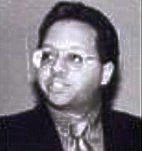
Corrales discusses newest book, unusual profession
By MARCIE SCHELLHAMMER
The Bradford Era
10-28-05
Bradford resident Scott Corrales speaks about his feelings on UFOs and the paranormal without worry of being dismissed as "nuts." After all, among those who seek his counsel are The Discovery, National Geographic and The History television channels.By MARCIE SCHELLHAMMER
The Bradford Era
10-28-05
The author of several books, including his most recent release "Flashpoint: High Strangeness in Puerto Rico," deals with skepticism with a hearty sense of humor.
"You have to have a terrific sense of humor," he explained Friday. People will send alien stickers in the mail, or small "E.T." figures to him.
"It's become a little sub-order of study," Corrales said with a laugh.
Known in several countries as an expert in the field, Corrales has been a guest on numerous radio shows and submitted articles to magazines - as well as having been interviewed for television.
On Aug. 21, a crew from National Geographic came to Bradford to talk to him about chupacabras. The show will air in December. Today, he will have a visit from The Discovery Channel about the "goat-suckers," an entity reported in Puerto Rico, Mexico and the southern U.S. which attacks livestock and drains their blood.
"It's an inclusive 10-year anniversary blowout to interview field researchers," Corrales said. He had written the first of his three books on chupacabras in 1995. He was selected because he is considered an expert.
"I'm moderately well-known as a troublemaker in the field," he said with a laugh. He explained that not all of the people involved in researching paranormal phenomena welcome information about activity elsewhere, and thus consider him a troublemaker in his quest to disseminate information.
"To constantly feed people information . . . it is well received by some and considered a nuisance by others," Corrales explained.
Some other information he plans to share with the television audience is on the history of UFOs.
He will be interviewed for The History Channel, which "wants me to discuss a history of UFO sightings going back to the first wave in the Americas in the 1500s ... in the Aztec Empire. They're interviewing researchers."
And that's what he considers himself, a researcher and a writer - a journalist whose "main interest is letting people know" about the subject of UFOs.
The most common questions he gets go something like this: Have you ever seen a UFO? "I never have," Corrales responds. Well, then, how do you know they exist? "I've never been to Australia, but I believe it exists," he says with a smile.
"Until you have a UFO that you can give to scientists, it cannot become a field of study," he explained. The UFO phenomenon is not predictable or repetitive - but during the 1970s and 1980s, it was frequent.
In the book "Flashpoint: High Strangeness in Puerto Rico," which was published in 1998 in England and is available now for the first time in America through Amazon.com's British counterpart, amazon.co.uk., Corrales explores that activity.
"It tries to give an objective chronological perspective on UFO activity in the Caribbean island of Puerto Rico," Corrales said of the book. "It's a prequel to 'Chupacabras.' "
Corrales explained that during the 1970s and 1980s, UFO activity was at its peak.
"It was widespread worldwide," he said. "The Caribbean, Mexico and Europe were rife with sightings."
While others enter the realm of speculation to explain the existence of the unidentified flying objects, Corrales does not. What are they? "No one knows and don't ever let them tell you," he replies with a laugh.
"We are gathering the information, creating a worldwide database on UFOs that will be useful to scholars and scientists 200 or 300 years from now," he said, explaining his view of UFO research. "In fact, you are tilling a field for the future."
He encourages anyone who has seen any UFO to report it to an organization, many of which are available on the Internet. That information could prove useful, he said. The phenomenon, while currently unexplained, may prove to be related to weather or earthquakes or volcanic activity or something - and the more information, the better.
"People should at least respect the people who come forward," Corrales explains, saying that it takes courage for a person to speak out about a paranormal experience.
"People would rather not have the unknown thrust upon them," he said, adding that making fun of a witness is hurtful.
"UFOs exist. We don't know what they are," he said, adding that he doesn't necessarily feel there's anything otherworldly to them.
"Given the vast distances involved ... it leads me to think the UFO explanation is a lot closer to earth," he said.
"When it comes to UFOs, you don't have them to study. You have people to study," Corrales said, explaining information must come from witnesses.
While in Puerto Rico researching for his book, he came across witnesses who told of their experiences "in case there was a greater danger to the community."
And, he recalled with a smile, he encountered at least one skeptic. Stopping at an open air food stand or lunch, he was asked by the waitress what he was doing there. When he told her he was researching UFOs, she told him they didn't exist.
"Why not?" he asked.
"Because if they did, they would eat here," she replied with a laugh.
More . . .
Home

No comments :
Post a Comment
Dear Reader/Contributor,
Your input is greatly appreciated, and coveted; however, blatant mis-use of this site's bandwidth will not be tolerated (e.g., SPAM, non-related links, etc).
Additionally, healthy debate is invited; however, ad hominem and or vitriolic attacks will not be published, nor will "anonymous" criticisms. Please keep your arguments/comments to the issues and subject matter of this article and present them with civility and proper decorum. -FW